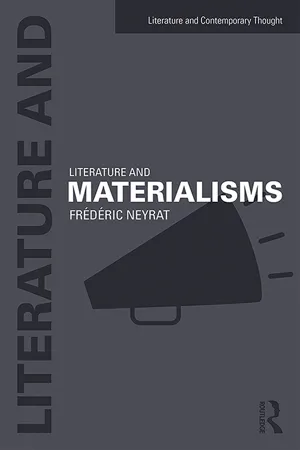
- 187 pages
- English
- ePUB (mobile friendly)
- Available on iOS & Android
Literature and Materialisms
About this book
Literature and Materialisms sheds light on the current new wave of materialisms and assesses the impact on literary theory and criticism. It maps the similarities and differences between speculative realism, object-oriented philosophy, and vitalism. A genealogy of materialisms, vitalisms, empiricisms, and realist approaches - from Heraclitus to Badiou, including Lucretius, Spinoza, Marx, Althusser, Barad, Spivak, Deleuze, Bennett, Harman, and other contemporary thinkers - puts these new trends into perspective.
This book investigates the relations between literature – from Marquis de Sade to objectivist poetry - and materialism and analyses the material aspects of literature, its structure and texture, its commodification and its capacity to resist market imperatives. It explores how literary style might be understood as a mediation between the 'immaterial' and the concrete features of a text.
This volume provides students and academics with an accessible overview of the study of literature and materialism.
Frequently asked questions
- Essential is ideal for learners and professionals who enjoy exploring a wide range of subjects. Access the Essential Library with 800,000+ trusted titles and best-sellers across business, personal growth, and the humanities. Includes unlimited reading time and Standard Read Aloud voice.
- Complete: Perfect for advanced learners and researchers needing full, unrestricted access. Unlock 1.4M+ books across hundreds of subjects, including academic and specialized titles. The Complete Plan also includes advanced features like Premium Read Aloud and Research Assistant.
Please note we cannot support devices running on iOS 13 and Android 7 or earlier. Learn more about using the app.
Information
1 Materialism and belief
On religion and politics
War on beliefs
God, or Nature
The death of God
Table of contents
- Cover
- Half Title
- Series Page
- Title Page
- Copyright Page
- Table of Contents
- Series editors’ preface
- Acknowledgments
- Introduction: The disconcerting materiality of literature
- 1. Materialism and belief: On religion and politics
- 2. Materialism and economics: On Marxism, ideology, and culture
- 3. Materialism and Subject: On anti-colonialism, post-colonialism, and feminism
- 4. Materialism and life: On new materialism and vitalism
- 5. Materialism and ontology: On empiricism, speculative realism, and object-oriented ontology
- 6. Materialism and realism: On literary realism, naturalism, and objectivist poetry
- 7. Materialism and matter: On physics and quantum physics
- 8. Materialism and language: Materiality, immateriality, and creation
- Conclusion: Ghost materialism
- Index